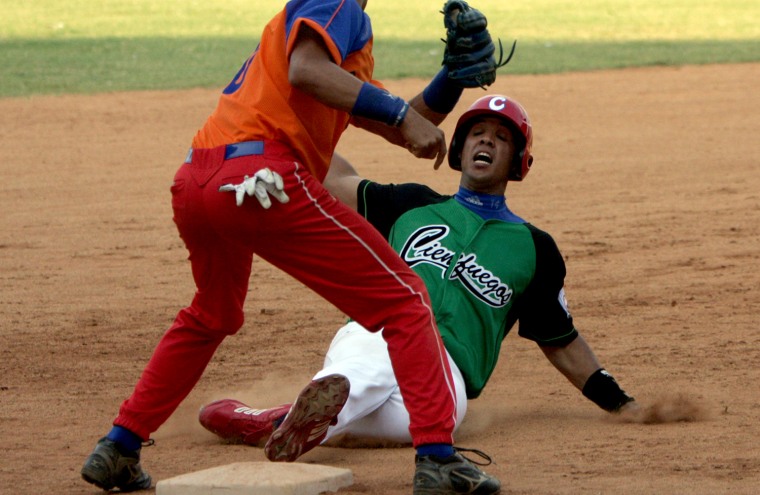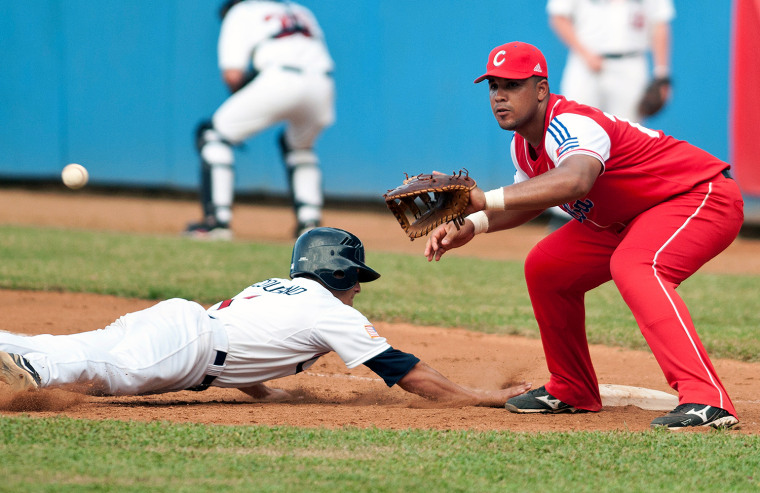HAVANA — Every day, men gather in Central Park here to shout, hurl insults and point fingers. People come and go, take sides, argue for hours. If you can’t follow Cuban slang, the scene can be unnerving: It looks like the beginning of a brawl.
But this is Havana’s famous Esquina Caliente — in English, the hot corner. And the arguments are always about what Cubans say is their national obsession, la pelota, the game of baseball.
These days, even in this disputatious park, there is not much arguing to do. Jose Dariel Abreu, the most powerful slugger on the island, is gone. And it is a blow both to Cuba's upcoming baseball season and to its pride.
“He’s leaving a hole,” said a fan who gave his name only as Alexis. “But it’s understandable. He’s following a dream.”
Abreu, 26, is believed to have defected, the latest ballplayer to make a run at tens of millions of dollars in the American major leagues. Published reports have put him in Haiti and the Dominican Republic.
What is certain is that Abreu, a star first baseman for the powerful Elephants of Cienfuegos team, did not show up this week for the upcoming Cuban national championships.
It is a foregone conclusion that Abreu would be desperately sought after by American teams. In eight seasons in Cuba, he has hit .334 — a figure that, while the statistics are not strictly comparable, would make him an elite hitter in the majors.

Two years ago, he was named Cuba’s most valuable player, recording an eye-popping .453 batting average and 33 home runs.
Cuba, a country whose modern history has been shaped by a former pitcher named Fidel Castro, considers the defection of baseball players a sore spot in its problematic relationship with the United States.
And the pace has picked up. More than two dozen Cuban players have defected in the past four years, among them the prized Cincinnati Reds relief pitcher Aroldis Chapman, whose fastball regularly tops 100 mph.
Chapman has a $30 million contract with the Reds. Yoenis Cespedes, a Cuban defector who won the Home Run Derby exhibition at the All-Star Game last month, has a $36 million deal with the Oakland Athletics.
And then there is Yasiel Puig, who has become perhaps the story of the year in Major League Baseball by hitting an otherworldly .368 in two months and producing a string of dramatic home runs.
In Esquina Caliente, it is not such a happy story. Some fans declined to talk to NBC News about their feelings toward Abreu because they were too angry. Others did talk, and appeared to take the defection personally.
“Forget the loss to the country,” Luis Pantaleón said. “This is a huge loss for my team, Cienfuegos. He’s the fourth guy we’ve lost. Another player left the country and two retired. But, man oh man, Jose Dariel Abreu — what a player! What a future!”
Then he clarified, “And it’s not just saying this because he’s from my hometown.”
Cuba has tried to slow the defections. The government decided in July to allow players to compete in some professional leagues abroad, including in baseball-crazy Japan and Mexico, under special government-approved contracts.
It does not appear to be working. One of the most recent defectors is Miguel Gonzalez, who at age 26 is nearing his prime as a player, and is reported to be on the verge of signing a fat contract with the Philadelphia Phillies.
A new rule in Major League Baseball, adopted to keep international stars from going to only the richest teams, restricts what each team can spend each year on the world market.
This year, for example, the woebegone Houston Astros can spend about $5 million, while the Washington Nationals, which were one of the best teams last year, can spend about $2 million.
But those same rules have a loophole for Cuban players who are at least 23 years old and have played in the Cuban professional leagues for at least three years. Those players can cash in, and Abreu is one of them.
“Maybe he wants to be a champion in the majors because he sure has talent,” said Freddy Ocaña, another fan at Esquina Caliente. “I can see him becoming a cleanup hitter for the New York Yankees or something along those lines.”
But he cautioned that Abreu, who is known as Pito, will have to practice harder. Ocaña, in a point of national pride, said that Abreu is not the only player in Cuba good enough for the major leagues — most Cuban pros could hack it there, he said.
“Pito Abreu is looking for opportunity,” he concluded. “Something he felt he didn’t have here.”
Erin McClam reported from New York. Reuters contributed to this report.
